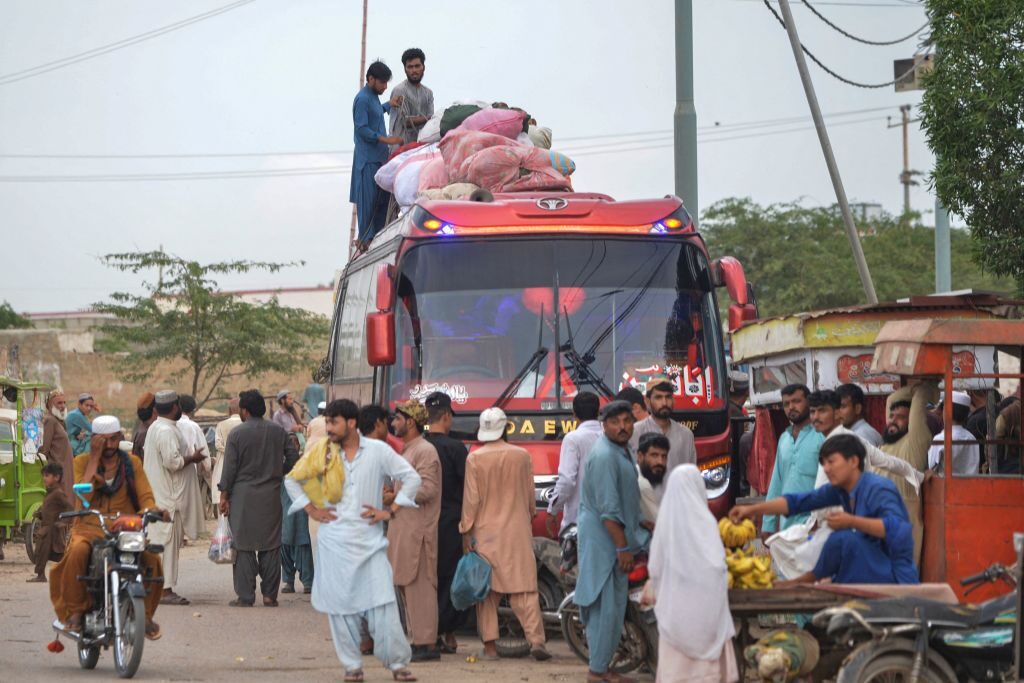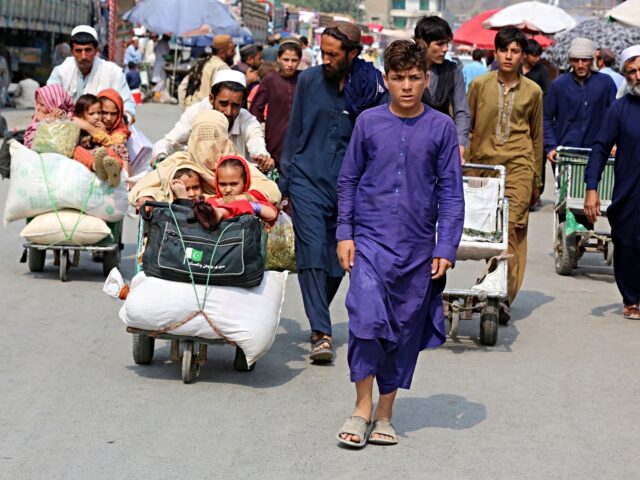Pakistani media reported on Monday that the government has deported 59,561 Afghan migrants in less than a month, with seven days to go until Islamabad’s deadline for all illegal migrants to return to Afghanistan.
The remarkable number reportedly expelled so far is just a fraction of the estimated 1.73 million Afghan migrants living in Pakistan illegally at the beginning of the purge.
The Taliban regime in Afghanistan reacted with outrage in early October when Pakistan said it was prepared to use force to expel migrants who did not depart voluntarily by November 1.
“The Pakistani side should reconsider its plan. Afghan refugees are not involved in Pakistan’s security problems,” complained Taliban spokesman Zabihullah Mujahid, referring to Pakistan’s contention that the tide of migrants that flowed across the border after the Taliban conquest of Afghanistan in 2021 included a large number of terrorists and saboteurs.
Pakistan’s primary security concern in the border regions is Tehrik-i-Taliban (TTP), the “Pakistani Taliban,” an offshoot of the Afghan Taliban with a similar philosophy about violently overthrowing secular governments to replace them with “Islamic emirates.” Pakistani officials say the rate and intensity of TTP terrorist attacks increased considerably after the Taliban captured Kabul and some of those attacks have been perpetrated with American weapons President Joe Biden abandoned in Afghanistan.
Afghanistan’s Khaama Press reported on Monday that the Pakistani government has been feeling some pressure from Western governments to scale back its aggressive deportation plan, particularly its pledge to use force against illegal migrants who refuse to leave by November 1.

In this photo taken on September 21, 2023, Afghan refugees board a bus from Karachi to Afghanistan. Afghans have poured into Pakistan in their millions after successive wars, many living in aid camps with restricted access to education, healthcare and employment. Around 1.3 million are registered refugees and 880,000 more have legal status to remain in Pakistan, according to the latest U.N. figures. (RIZWAN TABASSUM/AFP via Getty)
“In a meeting with some Western officials yesterday, the Interior Minister of Pakistan reassured that migrants who are eligible or those awaiting visas from Western countries will not be deported from Pakistan,” Khaama Press said.
A group of 80 former U.S. diplomatic officials and representatives from migrant organizations wrote an open letter last Wednesday to the Pakistani government, asking it to hold off on deporting Afghans relocated under an American program for helping people at high risk of persecution escape from Taliban rule.
The letter reminded Pakistani officials that thousands of Afghans currently sheltered in Pakistan have been waiting for over two years for the Biden administration to process their visa applications. Those refugees have been living difficult lives in Pakistan and would be at great risk of lethal hardship or violent persecution if they were deported back to Afghanistan.
“We appreciate Pakistan for providing refuge to our allies following America’s withdrawal from Afghanistan, but this decision would only cause chaos and make a bad situation worse. We urge Pakistan to work with us to resettle qualifying individuals in the U.S., not send them back to Afghanistan where they face certain doom,” the letter said.
“These deportations would not be consistent with Pakistan’s humanitarian tradition, and if pursued, would certainly adversely impact Pakistan’s relationship with the United States and could cause lasting damage to Pakistan’s reputation among the international community,” the signatories cautioned.
Pakistani media reported on Monday that Pakistani Interior Minister Sarfaraz Ahmed Bugti, a “caretaker” appointee holding the position until elections can be held to form a new government, promised Western diplomats that no one enrolled in the U.S. visa application process will be deported. Bugti urged America and other Western nations to expedite the applications and clear up the backlog as quickly as possible.
Pakistan is still moving ahead with its deportation plan for other Afghans and it remains unclear what the Pakistani government will do when the November 1 deadline arrives, since the bulk of remaining Afghan migrants are not enrolled in Western visa application programs.
“We strongly encourage Afghanistan’s neighbors, including Pakistan, to allow entry for Afghans seeking international protection and to coordinate with international humanitarian organizations such as UNHCR and IOM to provide humanitarian assistance,” U.S. State Department spokesman Mathew Miller said on Thursday.
UNHCR is the United Nations Human Rights Commission, while IOM is the U.N.’s International Organization for Migration. The U.N. last week called on Pakistan to “stop all forced returns and continue to host Afghan nationals who fled for safety.”
“We are also concerned by reports that Afghans living in Pakistan have been subjected to arrests, exploitation and undignified treatment, including since Pakistan announced its repatriation plans,” UNHCR said.
A female refugee told Voice of America News (VOA) on Friday that her husband worked for American outlets as a journalist before the family fled Afghanistan for Pakistan, “so we cannot go back, because his life would be in danger there.”
“When I go outside, I am lost in my thoughts because I don’t have a visa, my husband doesn’t have a visa. What should we do? If the police come and arrest him, what will I do with my three children?” she wondered.

COMMENTS
Please let us know if you're having issues with commenting.